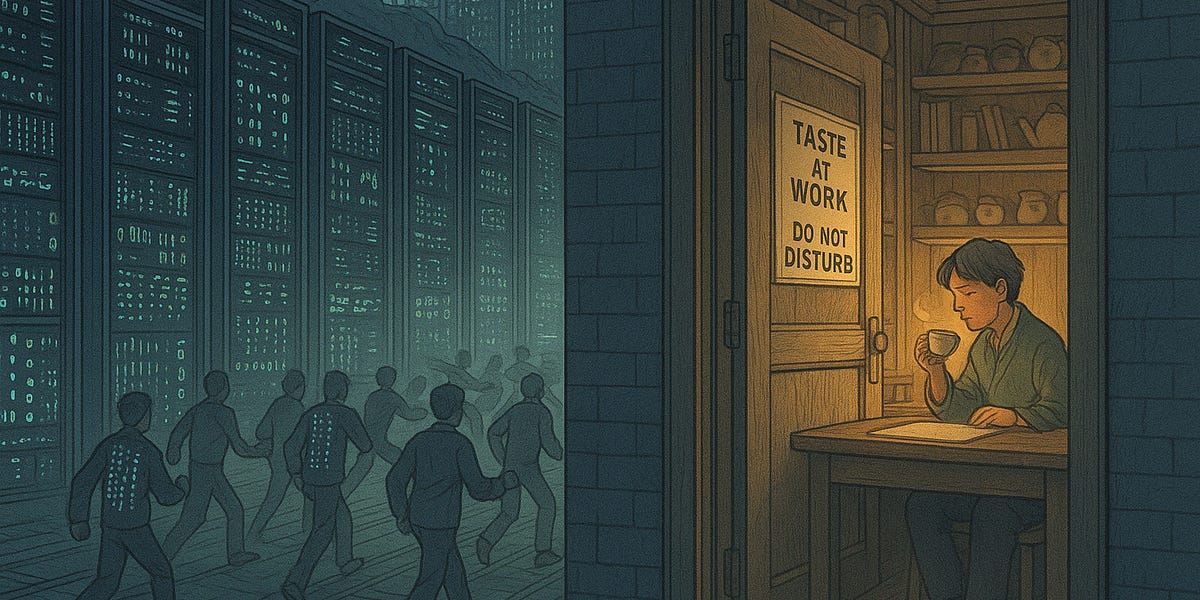
Metadata
- Author: Sangeet Paul Choudary
- Full Title: The Vibe Coding Paradox
- URL: https://platforms.substack.com/p/the-vibe-coding-paradox
Highlights
- Most people, sensing the new speed, get onto a productivity treadmill, constantly producing. Developers brag about how Claude or Cursor has replaced Netflix as their late-night addiction.
What looks like productivity and faster work
is really the commoditization of execution. (View Highlight)
- Tasks that once conferred competitive advantage through difficulty or skill are now widely replicable. But as execution becomes easier, the value of any individual action goes down, (View Highlight)
- This brings us to what I call The Vibe Coding Paradox. The more frictionless execution becomes, the more it loses value. (View Highlight)
- Value shifts to discernment - knowing what to produce. But instead of adjusting to this shift, most people double down on output. They respond to new capability with more action, not better intention. (View Highlight)
- If execution is no longer scarce, the thinking goes, then the only way to stand out is to do more of it. The result is a kind of productivity treadmill: lots of movement, little meaning. This logic is, of course, flawed and self-defeating. When output becomes frictionless, quantity can become a liability. (View Highlight)
- The more we produce without purpose, the harder it becomes for anyone to distinguish the meaningful amongst the noise. We create more than ever, but it doesn’t stick. It doesn’t shape us, or others. The real scarcity shifts from doing to choosing what to do. Discernment, not productivity, becomes the differentiator. (View Highlight)
- So in the midst of abundance, what is valuable?
Value migrates to those who choose carefully and act selectively.
To the three core capacities that define advantage in an age of abundance:
- Meaningful restraint
- Careful craft
- Developed taste Eventually, in a world of cheap and abundant answers, good questions matter the most: (View Highlight)
- When your previous edge becomes abundantly available, you can’t just continue playing more of the same old game. You need to change your game. Abundance kills advantage, unless you shift the game. (View Highlight)
- In high-execution environments, restraint helps you think carefully about how the playing field is changing. If you keep playing the old game - only faster - there is no way you can step back to learn the new rules.
Restraint helps you step away from a game that isn’t worth winning anymore. (View Highlight)
- When everyone can build, scarcity shifts from product to meaning. If everyone can produce and flood the market with products (whether code or writing or spammy LinkedIn invites), our limited attention craves meaningful narrative. (View Highlight)
- Abundance simply relocates scarcity. Careful craft, in this sense, creates meaning around your creations. But it also creates meaning for you in your work. Excessive execution can make us feel disconnected from our work. The friction involved in creation helped us connect with what we created. As creations become easier to churn out, meaning has to be brought in through narrative. In a high-execution world, where tools threaten to abstract us from our own creations, careful craft keeps the feedback loop tight. It trains judgment. It builds taste. Careful craft holds a kind of asymmetric power. When everything speeds up surface-level cycles, the few who know how to go deep, will create something that stands out from the rest. (View Highlight)
- You can’t shortcut your way to taste. It’s tacit knowledge, something you can’t easily codify or explain. Tools can help you execute faster, but they lack taste. Taste is an interesting form of ‘knowledge work’ that remains immune to AI. And it becomes especially valuable when execution is easy, because it’s the only reliable way to cut through commoditized outputs. If anyone can generate a hundred options, taste helps choose the one option that makes sense to pursue. In a high-execution world, taste attracts attention and cuts through the noise. (View Highlight)
- Stop blitzscaling, start tinkering instead In the age of abundant execution, tinkering moves from a weekend side-hustle to becoming your central advantage in the constant pursuit of career reinvention. Blitzscaling tries to scale before the system knows what it’s scaling. Tinkering starts small and adjusts constantly, listening for what matters and what doesn’t. Tinkering develops taste! (View Highlight)
- For creators, founders, and designers navigating a world where execution is cheap, the temptation is always to move fast. But as speed becomes abundant, it stops being strategic. This is where taste, as a strategic asset, demands a different approach. It’s no longer enough to define your taste as a set of personal preferences or abstract principles. In environments shaped by abundant execution, taste has to become operational. It must be codified into decisions, embedded into workflows, enforced through constraints; not by micromanagement, but by structure. (View Highlight)